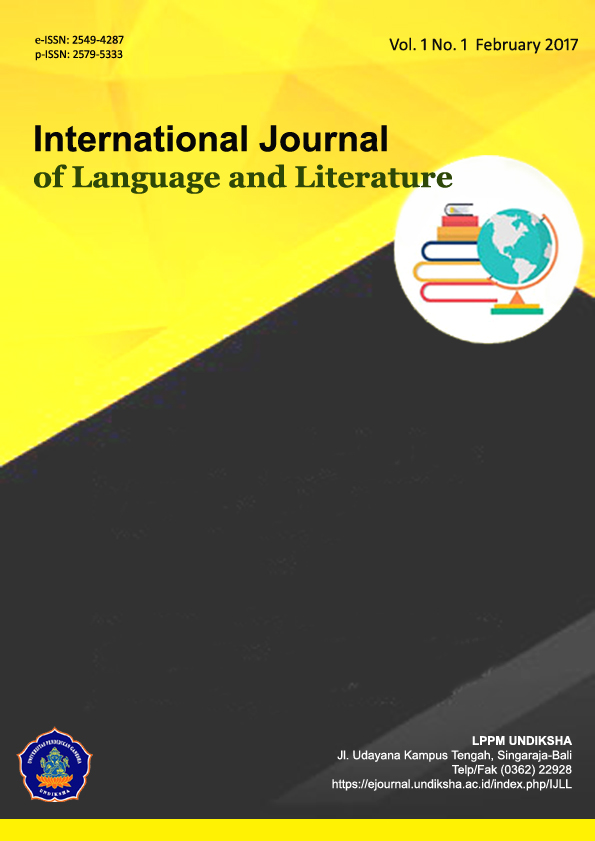CORRELATION AMONG READING INTEREST, READING SELF-EFFICACY, AND READING COMPETENCY IN THE JUNIOR HIGH SCHOOL
DOI:
https://doi.org/10.23887/ijll.v4i3.30299Keywords:
correlation, reading competency, reading interest, reading self-efficacyAbstract
The current research objectives were to describe and to relate the students’ reading interest, reading self-efficacy to their reading competency in the Sekolah Menengah Pertama Negeri 8 Singaraja. The subject were the students in the eight-grade students. This research was designed a quantitative research. The data were gathered using reading interest scale, reading self-efficacy scale, and objective reading competency test. The obtained data were analyzed in two phases, namely: descriptively, that is the description consisted of central tendency and inferentially, that is the data were analyzed using pair-wise correlation and multiple correlation technique. The findings show that: 1) the students’ reading interest, reading self-efficacy, and reading competency on high-order-items are at the moderate levels;2) the relations pair-wisely between the students’ reading interest and reading self-efficacy, students reading interest and reading competency, the students’ reading self-efficacy and reading competency on high-order-items are positively and significantly correlated; and 3) the simultaneous or multiple relationships of the reading interest and reading self-efficacy to the students’ reading competency is proven to be significant.References
Crawley, S. (1995). Strategies for Guiding Content Reading. Boston: Allyn and Bacon.
Fahrurrozi, D. (2017). Relationship between Students’ Reading Interest and Vocabulary Mastery with Reading Comprehension ability. 118, 357–363. https://doi.org/10.2991/icset-17.2017.59 DOI: https://doi.org/10.2991/icset-17.2017.59
Hesham Suleiman Alyousef. (2006). Teaching Reading Comprehension to ESL / EFL Learners. Journal of Language and Learning, 5(1), 379–380.
Hinkl, D. E. (2009). Applied Statistics for the Behavioral Sciences . Chicago : Rand McNally.
Kebudayaan, K. P. (2013). Badan Pengembangan Sumber Daya Manusia Pendidikan dan Kebudayaan . Jakarta.
Mohseni Takaloo, N., & Ahmadi, M. R. (2017). The Effect of Learners’ Motivation on Their Reading Comprehension Skill: A Literature Review. International Journal of Research in English Education, 2(3), 10–21. https://doi.org/10.18869/acadpub.ijree.2.3.10 DOI: https://doi.org/10.18869/acadpub.ijree.2.3.10
OECD. (2019). PISA 2018 insights and interpretations. OECD Publishing, 64. https://www.oecd.org/pisa/PISA 2018 Insights and Interpretations FINAL PDF.pdf
PISA 2012. (2012). Results in Focus.
Pisa 2015. (2015). Results in Focus. 853.
Pourhosein Gilakjani, A., & Sabouri, N. B. (2016). How Can Students Improve Their Reading Comprehension Skill? Journal of Studies in Education, 6(2), 229. https://doi.org/10.5296/jse.v6i2.9201 DOI: https://doi.org/10.5296/jse.v6i2.9201
Rachmajanti, S., & Musthofiyah, U. (2017). The Relationship Between Reading Self-Efficacy, Reading Attitude and EFL Reading Comprehension Based On Gender Difference. (Journal of English Language, Literature, and Teaching, 1(1), 20–26.
Scherbaum, C. A., & Kern, M. J. (2006). O 1047. 1047–1063. DOI: https://doi.org/10.1177/0013164406288171
Downloads
Published
How to Cite
Issue
Section
License
IJLL Journal provides immediate open access to its content on the principle that making research freely available to the public to supports a greater global exchange of knowledge.

This work is licensed under a Creative Commons Attribution-ShareAlike 4.0 International License







